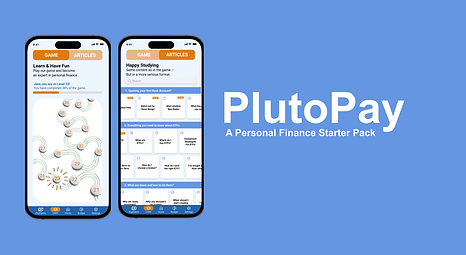
Timeline
4 Weeks
My Role
Solo Student Project for CareerFoundry's UX Bootcamp
PROBLEM
UNDERSTAND
Gender disparity within the art world is still accepted as the norm.
Female artists are fundamentally underrepresented in galleries and museums. Though this misrepresentation is incrementally improving in this day and age, gender disparity within the art world is still accepted as the norm by the general public.
SOLUTION
By creating an app that curates dedicated tours in well-known exhibitions, only highlighting artworks created by female artists, we aim to shed light and awareness on the sexism occur in each art epoch, whilst providing you the opportunity to get to know artists, female, that have been overlooked.




Have people feel and see inequality firsthand

COMPETITION
Existing companies and apps have been researched to understand the current market for a) the digitalization of museums and b) highlighting gender discrepancies in the art world. This was a difficult task, as no companies have entered this niche market.
However, free mobile applications from popular museums have been studied and used as a reference to understand how museums communicate tours and educational information is communicated to their guests

Example: Mobile application of the National Museum of Norway
Companies have not entered this niche market.
USER STORIES

Online Survey Research
ONLINE SURVEY + KEY INSIGHTS
USER RESEARCH
15 people participated in a 12-question online survey.
Insights Generated from the Online Survey
-
Apps are not used widely to enhance a museum experience
-
Museums are often seen as old and dusty
-
Many visit museums during travel
-
The gender discrepancies in the art world are well known
-
A need exists to focus more on female artists
Online Survey Research

INTERVIEWS
Three interviews were conducted, taking approx. 15 minutes to get through 10 questions. Quotes were transcribed and sorted into affinity maps.
Online Survey Research
Qualitative Data collected by the User Interviews and overall learning extracted from the online surveys resulted in a large cluster of data. To clean this up, individual quotes were separated into respective categories to get a better understanding of the behavioral patterns, frustrations, and desires of potential muSHEum users.
AFFINITY MAPPING

USER JOURNEY
Now understanding the persona’s objectives, User Journey's were assembled to gain insights on how these tasks could be broken down, and more importantly, how the persona would feel throughout this process.

USER FLOW
Curated User Journeys were translated into user flows, envisioning each step the user would take in order to complete a certain task, building the foundation for the app’s information architecture and first low-fidelity wireframes to be created.

Scenario:
Thomas would like to participate in a physical tour that is digitally guided, focusing only on female-created art during his weekend visit at the Tate Modern in London.
SITE MAP
IDEATE
Curated User Journeys were translated into user flows, envisioning each step the user would take in order to complete a certain task, building the foundation for the app’s information architecture and first low-fidelity wireframes to be created.

LOW FIDELITY WIREFRAMES
Sketching the first iteration
Booking a Tour

Exploring Artists

MID FIDELITY WIREFRAMES
Evolving the design
The low fidelity wireframes offered a basic layout of what I envisioned to do. Using this as my foundation, I expanded on my vision with mid-fidelity prototype to also be used as my minimum viable product in usability testing.
Booking a Tour

Exploring Artists

USER TESTS
USER TESTING
The mid fidelity prototype was tested by three participants in remote usability tests, conducted via Zoom. Each participant was given the same four tasks to complete within each tests, while thinking out loud for me to better understand their thought process.
After data collection, all qualitative data was dissected into individual quotes, at times condensed too. All quotes were transcribed to individual sticky notes for each participant. Rearranging sticky notes of all participants in the form of an Affinity Map, categorizing said quotes by different topics, allowed for collected usability feedback to be understood more granularly and enabled me prioritize design errors accordingly.
AFFINITY MAPPING

Revisions are needed!
-
Revise the information architecture by:
-
Adding a dedicated navigation button to explore the list of artist
-
Removing the game and adding it as an end of tour feature
-
Removing the settings button from the navigation bar
-
-
Strip down the onboarding process and add a click-through introduction tour
-
Add an additional frame to showcase other initiatives advocating on behalf of female artists
-
Use UI and gestalt principles to distinguish text in the tour
-
Ensure exits points and navigation arrows are evident
HIGH-FIDELITY PROTOTYPE
Visual Design
Polished Version
Booking a Tour

Exploring Artists

The Style Guide

What I would do next:
-
Continue with more elaborated usability testing
-
Conduct preference tests to improve UI
-
Split Tour more easily digestible steps
-
Include a map of the museum route
-
Collaborate with museums to make use of their art databases
This project was created out of my own personal interest in a) gender equality and b) art. It was astonishing to research this topic to see how far we as a society still need to go, but hopeful that all those interviewed were motivated to move forward and catalyze change. This app serves its purpose of opening users’ eyes to the discrimination within the arts while enhancing a physical trip to the museum.
THAT'S THAT.

